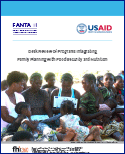
Family planning and reproductive health services have been prioritized in the USAID Multi-Sectoral Nutrition Strategy 2014–2025 as nutrition-sensitive interventions that address the underlying and systemic causes of malnutrition. However, there is limited peer reviewed literature and a dearth of documentation on how to best integrate family planning with food security and nutrition programming. To address this gap, FANTA conducted an extensive desk review to identify and synthesize programmatic experiences, including integration models, platforms, contact points, and providers used for integrated service delivery. This report synthesizes learnings from 102 health and multisectoral programs, including a rich set of program examples and three case studies, to illustrate the various ways programs are integrating family planning with nutrition and food security interventions. Lessons learned, promising practices for programming, and recommendations for USAID are also provided in the report and brief.


